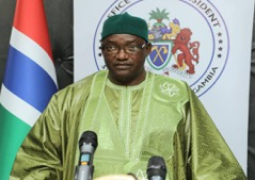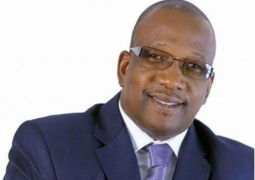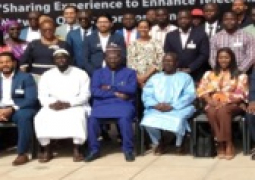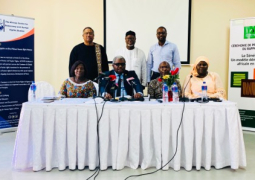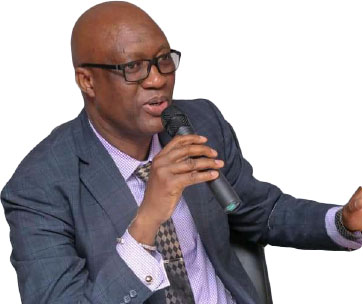
“Most of the basic commodities that are coming into the country don’t pay VAT. “The only thing they pay at GRA is the duty. Even the duty itself, some of them are coming free like rice. There’s no tax on rice and there is zero duty. I can tell you that there is no VAT on rice. As far as the government is concerned, we are doing everything humanly possible to eliminate the cost, for example, the vegetable cooking oil. In fact, now we are receiving it in The Gambia at free cost,” he said on Tuesday during an interview with West Coast Radio on its famous Coffee Time.
“As far as GRA is concerned, we didn’t increase any tax over a long period of time. In fact, at GRA, we don’t even have the mandate to increase taxes. To have taxes go up or down is a policy decision from the Ministry of Finance. Even if the Ministry of Finance proposed it, they have to go to the parliament. Prices are going up because there is a problem in the world and people must understand this and accept it,” he posited.
The government, he went on, is losing a lot of revenue when it comes to some of these basic commodities, adding that the price hike is a matter of global problem and external factors.
According to him, the revenue target for GRA this year is D13.5 billion dalasis. “Government has given out D32 million dalasis on subsidies for January and D57 million dalasis for February and in March alone is D130 million dalasis. This money could have been collected by us and help us to meet our targets. However, because of the current circumstances and because of the current world problem, the fuel prices in the world have gone so high. The government is coming in the form of a subsidies and that means we are losing revenue.”
“In this month April, we are likely to lose over D200 million dalasis. These are statistics. I am telling you this is what the government is going to lose. The real price for gas oil in April should have been 78.57 dalasis per litre. However, we are buying it at 61 dalasis; meaning we are given every litre 17.51 dalasis. Every liter, the government is losing D17.57 bututs. The actual price for petrol should have been D73.92 dalasis per litre but we are buying litres at D69.39, which means that the government is losing every litre that is sold. If you put all this together, the government is losing over D200 million dalasis which could have come as revenues,” he stated.
For his part, Abdoulie Jallow, the permanent secretary at the ministry of Finance and Economic Affairs, said the government is losing a lot of revenues due to the subsidies, claiming that this initiative is meant for Gambians to meet demands.
The government, P.S Jallow added, is giving a subsidy on petroleum. “The reason we are giving out subsidies on petroleum products is to stabilise and bring stability in the price of petroleum products. The government is doing this with a view to stabilise the prices on these products because we know they are very essential in the country. If prices on petroleum increase, it’s likely going to affect the price of all other commodities including direct services. The government is doing its best for price stabilisation as it has also provided a subsidy on electricity.”
He added: “I can comfortably tell you that the taxes we had in 2015 are the same taxes we have now. They didn’t change. We live in a very dynamic world and that Gambia can’t operate in isolation. You can see the on-going war between Ukraine and Russia is affecting the United States of America. America is experiencing inflation and the entire world is experiencing inflation. We live in a global integrated environment. So what happens in many other countries equally affects us.
“If you look at the current inflation in The Gambia and what is driving the inflation is mainly two aspects; which is international development and the prices of international commodities. Remember The Gambia is a small open economy and we heavily depend on imports. Much of the food we eat is imported either from Senegal or other parts of the world. Therefore, because we heavily depend on this import, our inflation is driven mainly by the prices of international commodities because we import them.”
The government, he continues, is doing everything possible to stabilise the prices of commodities in the country. “We were just having discussions even just now. If you look at what we are losing in terms of revenue on oil is significant. If you take January, February and March we lost nearly D200 million dalasis on petroleum related revenues. We took that shock and with the recent announcement on the prices of petroleum products, we are expecting just in April to lose nearly D200 million dalasis. This is what we are going to lose in revenue.”
“On the issue of fertilisers, we are anticipating the subsidy level will be around D600 million dalasis and this doesn’t include the subsidy on the purchase of groundnuts because we are anticipating buying around 30, 000 metric tonnes.”
Last year, he said, the Chinese were here and they bought a significant number of groundnuts and the government also bought nearly 7 tonnes of groundnuts. “This year we are buying nearly 50 metres tonnes because the Chinese are out of the market this year. Therefore, we have to step in and buy all these groundnuts and again because of the amount of groundnuts we are buying, the subsidy will increase.”


